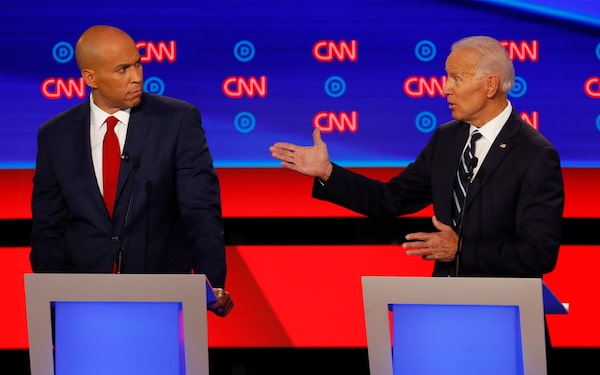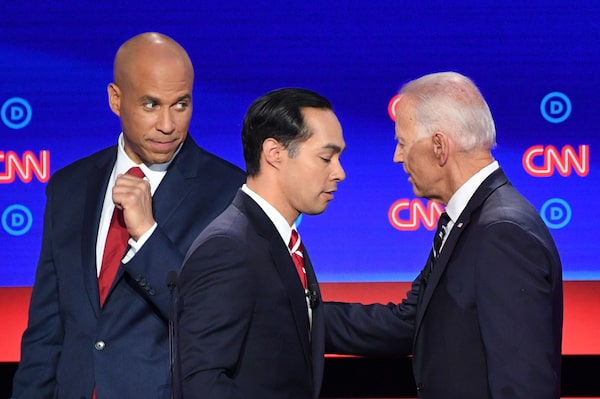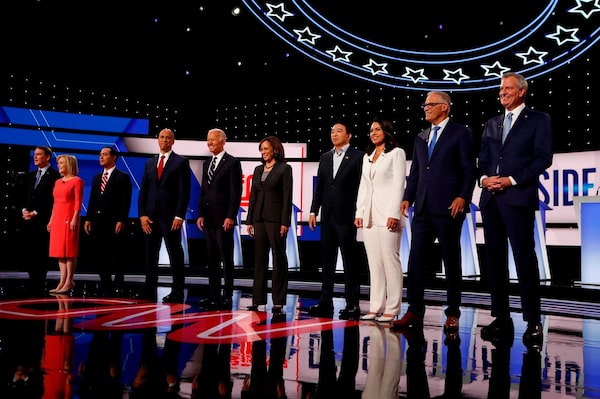Joe Biden walks on stage before the start of the second night of the second 2020 Democratic U.S. presidential debate in Detroit, July 31, 2019.LUCAS JACKSON/Reuters
Joe Biden faced sustained attacks during Wednesday’s Democratic presidential debate from rivals keen to highlight his shifting stands on crime, women’s rights and foreign policy during his decades in the U.S. Senate.
But the former vice-president, a centrist who remains the front-runner for the nomination, was also forced to defend more recent positions on trade and immigration from his time in the Obama White House to a party base that has moved leftward in the Trump era.
Months into the campaign to nominate a challenger to President Donald Trump in 2020, Mr. Biden continues to retain a healthy lead in most opinion polls. But he was widely criticized after the first round of debates in June for not pushing back against California Senator Kamala Harris when she brought up his opposition to school busing.
The July Democratic debates: Five key takeaways from night one
Analysis: The Democratic debates exposed a failure to resolve the party’s growing identity crisis
Opinion: The great divide: The civil wars gripping America’s political parties

Sen. Kamala Harris, D-Calif., speaks as former vice-president Joe Biden listens during the second of two Democratic presidential debates.Paul Sancya/The Associated Press
He had publicly signalled he was readying for a fight this time. “Go easy on me, kid,” he could be heard telling Ms. Harris moments before the debate began.
But what was expected to be a rematch between the two candidates turned out to be a wide-ranging blitz on Mr. Biden by most of the nine other candidates on stage, many of them looking to generate momentum ahead of a summer fundraising rush to qualify for the next debates in September.
At 76, and with a political career that spans more than four decades, Mr. Biden had struggled to defend himself against criticism of past positions that were once seen as mainstream but now appear to be out of step with younger Democrats. He has highlighted his ability to put differences aside and work with segregationists in the Senate and attempted to explain his opposition to 1970s-era federal plans to use busing to desegregate the U.S. school system.
His long political career proved to be a liability again Wednesday night. Ms. Harris attacked the former vice-president on his history of voting for the Hyde Amendment, a longstanding measure that restricts the use of federal funds for abortion. Senator Kirsten Gillibrand of New York grilled Mr. Biden on a 1981 newspaper editorial he wrote opposing the expansion of tax credits to pay for child care.

Sen. Cory Booker, D-N.J., listens as former vice-president Joe Biden speaks.Paul Sancya/The Associated Press
But his sharpest rebuke came from New Jersey Senator Cory Booker, who took Mr. Biden to task for a 1980s crime bill that critics say has disproportionately harmed African-American communities.
“There are people right now in prison for life for drug offences because you stood up and used that ‘tough on crime’ phony rhetoric that got a lot of people elected but destroyed communities like mine,” said Mr. Booker. In a debate held in Detroit, Mr. Booker’s criticism served to highlight the key role black voters are expected to play in the Democratic primaries.
Mr. Biden responded haltingly to some criticisms but pushed back aggressively against others. He pointed to Mr. Booker’s own track record as mayor of Newark, N.J., including a zero-tolerance policy toward crime that drew the ire of civil rights groups.
“There was nothing done for the entire eight years he was mayor, there was nothing done to deal with the police department that was corrupt,” Mr. Biden said.
“If you want to compare records – and, frankly, I’m shocked that you do – I am happy to do that,” Mr. Booker replied.
Mr. Biden frequently used the televised event to reference his association with former president Barack Obama, who remains popular among Democratic voters. “I find it fascinating. Everybody is talking about how terrible I am on these issues,” he said during an exchange with Mr. Booker on criminal justice reform. “Barack Obama knew exactly who I was.”
But the debate highlighted the deepening ideological rift within the Democratic Party among moderates like Mr. Biden, who are focused on re-engaging the broad coalition that catapulted Mr. Obama into office, and progressives who believe the path to the White House will require energizing the party’s left wing.

Democratic presidential hopefuls U.S. Senator from New Jersey Cory Booker, former U.S. secretary of housing and urban development Julian Castro and former vice-president Joe Biden chat during a break in the second round of the second Democratic primary debate.JIM WATSON/AFP/Getty Images
Mr. Biden was forced to defend Mr. Obama’s record on immigration, including periods when deportations surged to levels higher than any year of the Trump presidency. He sparred with a fellow Obama administration official, former housing secretary Julian Castro, on whether to decriminalize illegal border-crossings, saying Mr. Castro had never raised the issue in meetings.
“It looks like one of us has learned the lessons of the past and one of us hasn't,” said Mr. Castro, who has called for the U.S. to stop prosecuting unauthorized border crossings as crimes.
Mr. Biden also walked back his support for trade deals such as the Trans-Pacific Partnership. As vice-president, he was a key figure in pressing Congress to support the agreement, which was the centrepiece of Mr. Obama’s strategy to engage Asia, only to see Mr. Trump officially pull the U.S. out of the deal.
Instead, Mr. Biden said he would only enter the TPP – since rebooted by the remaining countries as the Comprehensive and Progressive Agreement for Trans-Pacific Partnership – if it were renegotiated to improve environmental and labour provisions. “Either China is going to write the rules of the road for the 21st century on trade or we are,” he said. He told New York Mayor Bill De Blasio that he would oppose the renegotiated North American free-trade agreement unless it included more involvement from trade unions.

From left, Sen. Michael Bennet, D-Colo., Sen. Kirsten Gillibrand, D-N.Y., former Housing and Urban Development Secretary Julian Castro, Sen. Cory Booker, D-N.J., former Vice President Joe Biden, Sen. Kamala Harris, D-Calif., Andrew Yang, Rep. Tulsi Gabbard, D-Hawaii, Washington Gov. Jay Inslee and New York City Mayor Bill de Blasio are introduced before the second of two Democratic presidential primary debates.The Associated Press
While Mr. Biden drew much of the night’s fire, he was not the only candidate to come under attack. Ms. Harris, whose performance in the June debate gave her a boost in polls, was pressed by both Mr. Biden and Hawaii Congresswoman Tulsi Gabbard on her record as attorney-general for California.
Mr. Biden accused the freshman senator of doing little as California’s top prosecutor to promote the racial integration of school districts in her state and for presiding over a 2010 scandal involving a police crime lab that forced the state to overturn hundreds of drug cases.
“She kept people in prison beyond their sentences to use them as cheap labour for the state of California,” Ms. Gabbard said.
Ms. Harris countered that she had pushed through criminal justice reforms and had declined to seek the death penalty in high-profile murder cases. “I am proud of making a decision to not just give fancy speeches … but actually doing the work,” she said.
Our Morning Update and Evening Update newsletters are written by Globe editors, giving you a concise summary of the day’s most important headlines. Sign up today.
 Tamsin McMahon
Tamsin McMahon